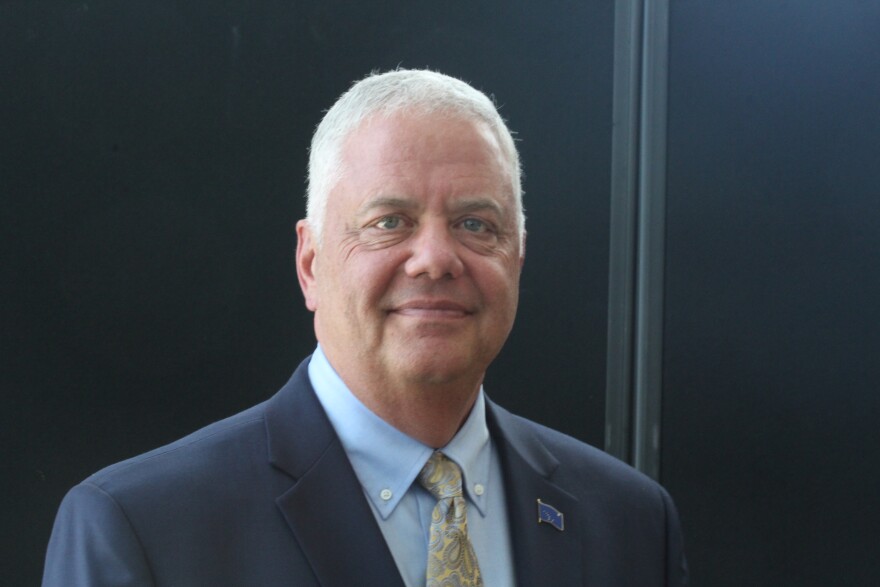There are thousands of open job in Anchorage, and not enough workers to fill them, according a report from the Anchorage Economic Development Corp.
AEDC CEO Bill Popp presented the corporation's three-year economic outlook on Wednesday. Even before the pandemic, Popp said, the state was in rough fiscal waters as the price of oil began to drop in 2016.
“The Lower 48 economy was red hot from 2015 to early 2020, before COVID, while Anchorage and Alaska were in the longest recession our state had seen in decades,” Popp said to a packed audience of business leaders at the Dena'ina Center downtown.
That led to a large number of workers leaving the state, he said.
Fast forward to 2022, and Popp said there are now a record numbers of job openings in Anchorage, but not enough workers to fill them. It’s not because people don’t want to work, he said.
“There are not thousands of workers sitting at home, playing video games or watching TV, rather than going to work because of government subsidies or unemployment benefits," he said.
He said Anchorage currently has a 79% labor force participation rate, which he said is very high. That means the city needs to grow its workforce to keep up with job openings.
As far as where the jobs are, Popp said the transportation industry, construction and business sectors are all gaining jobs. Also, the Ted Stevens Anchorage International Airport is now the fourth busiest cargo airport in the world and officials anticipate record numbers of passengers by 2025.
Oil and gas, health care and state jobs are among sectors on the decline.
Popp said the biggest success is the tourism industry.
“This sector leads job growth in our city, adding over 2,600 jobs so far in 2022," he said. "Hotels are packed and rates are way up. Convention bookings are rebounding solidly. Passenger numbers at the airport are at near pre-pandemic levels. All in the face of a relentless shortage of workers to fill hundreds of jobs going vacant for lack of workers.”
He said housing is one issue that needs to be addressed to get more workers to Anchorage. Anchorage didn't see a lot of homes built as the pandemic slowed the city down. The price of housing has also gone up, with the average Anchorage home valued at just over $450,000. Popp said there are record-low numbers of homes being listed for sale.
“Our problem there is that we’re land poor, in terms of readily, easily developable housing," Popp said. "But we’re also developing housing that’s more focused backwards in our perspective. We need to start thinking about the kinds of housing that will create new opportunities for changing tastes in housing. And that’s going to be more vertical in some parts of Anchorage.”
Popp said that building strategy could increase the number of residents living downtown from about 1,000 to more than 5,000. AEDC officials predict an increase of about 500 homes across the city by the end of the year.
Popp said the city will also have to invest in making Anchorage a more attractive place to live.
He described Oklahoma City as the gold-standard example of a boom-bust oil town, like Anchorage, that was able to transform into a major tech and tourism destination due to city investment over 30 years — with a 1% sales tax.
“Between their sales tax and their bonds,
Popp said making major strides in developing Anchorage will require a similar investment.
“These projects take a decade or more to get done," he said. "The business community, the community at-large has got to be there saying, ‘OK. This is what we agreed to. This is where we’re going.' And we can’t change course because there’s a new administration. We’ve got to move on and continue to focus on what we all agreed to at the beginning. And I think that’s one of the big secrets to Oklahoma City’s success.”
Popp said a contingent of business officials from Anchorage will travel to Oklahoma City later this year to gauge how best to replicate that city’s success back home.
Despite the workforce challenges, Popp said, he is optimistic about Anchorage's economic future.
“We see job growth on the horizon, new investment for our city, and opportunities in several industries for expansion," he said.
Editor's note: Bill Popp is a member of Alaska Public Media's Board of Directors.


